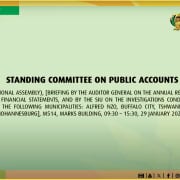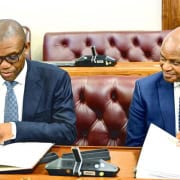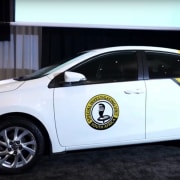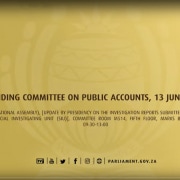|
Getting your Trinity Audio player ready...
|
Police commissioner Fannie Masemola, deputy police minister Cassel Mathale, and Special Investigating Unit head Andy Mothibi met on 14 June to brief the Standing Committee on Public Accounts (Scopa) on the progress of SIU investigations into Eskom, arising from corruption and sabotage allegations made by former CEO Andre de Ruyter.
Another police official, Brigadier Jap Burger, failed to show up even after Masemola instructed him to, citing security concerns. This was a problem, said Scopa chairperson Mkhuleko Hlengwa. “His absence this morning handicaps this meeting.”
The meeting formed part of Scopa’s work into determining whether an inquiry was required into the Eskom allegations. As the brigadier was an integral part of the committee’s assessment of the matter to arrive at a decision, his absence was problematic and furthermore, he had not provided an apology to Scopa.
Much of the discussion revolved around Burger’s absence and his security concerns. Members were angry that he was not there, as the main purpose of the gathering was to question him about his work on the investigation. They felt there was no justification for him not being there, and he simply had to appear, even if he had to be summonsed.
Scopa could not set a precedent of inviting people to appear before it, who did not attend. By so doing, the committee might in the future receive all kinds of excuses from people not wanting to attend committee meetings. Scopa needed the information in Burger’s possession, and would have to work with Masemola to find a way to get it.
However, the committee also expressed its concerns that senior police individuals were apparently afraid to express themselves to resolve these kinds of issues, which hesitation would aid in the proliferation of crime and criminality. What kind of message was being sent in terms of the police and Eskom-related matters, members asked. Masemola must assure the committee and the country that things were under control, and Scopa must receive assurance that Burger’s concerns would be attended to.
Members discussed the “very serious allegations” against people at Eskom. They named De Ruyter who had allegedly been poisoned and had seemingly gone to ground, and said it was worrying that now a brigadier tasked with investigating the matter, was apparently fearing for his life. This may well be validation of De Ruyter’s reluctance to trust the police, they said.
“How did it reach a point where the power utility of the country, which is facing very serious challenges to perform, spawned all of this? We seem to have a definite reluctance from the police, the Hawks, and the board to investigate. This is beginning to smack of the most enormous cover-up and reluctance to do anything about it.”
This would not take South Africa anywhere, members said.
Meanwhile, the SIU’s Mothibi reported that the organisation had received a copy of the contentious investigation report carried out by George Fivaz Forensic, the external company appointed to investigate De Ruyter’s allegations.
Consisting of 1 482 pages with 13 sub-reports, the Fivaz report is currently being subjected to SIU investigation methodology and protocols. Depending on the outcomes of this process, said Mothibi, the SIU will embark on further investigations and referrals.
“We are acutely aware that we have to deal with this report as urgently as possible and speedily to determine the course of action,” he said.








